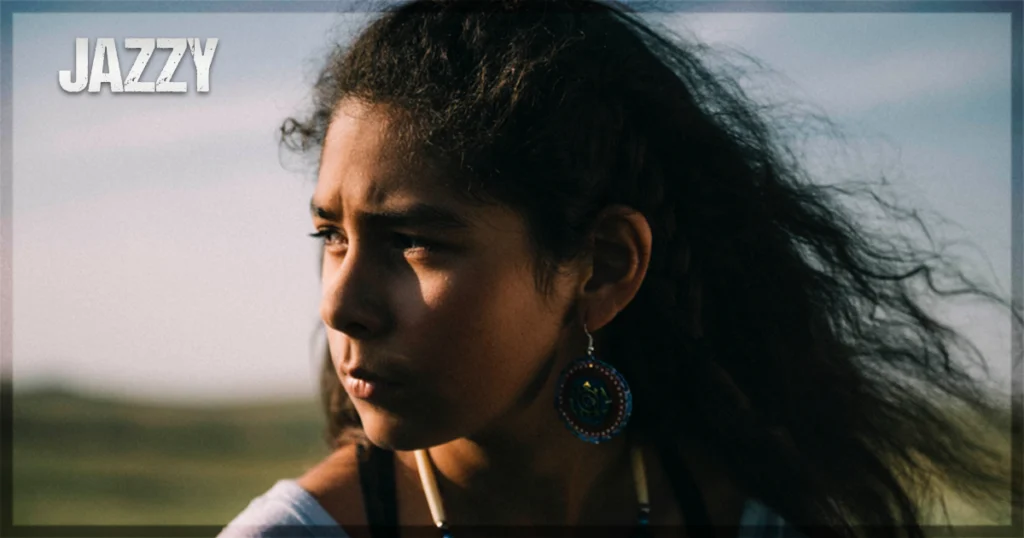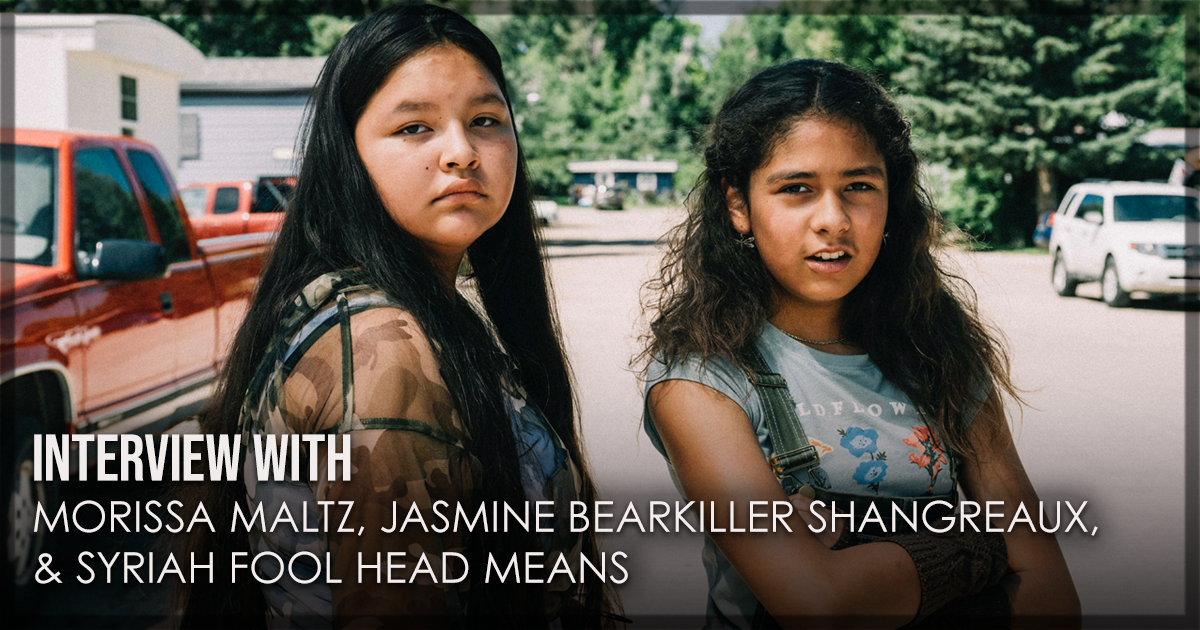Morrisa Maltz, Jasmine Bearkiller Shangreaux, and Syriah Fool Head Means sat down with us in an exclusive interview to chat about their film, Jazzy.
Filmmaker Morrisa Maltz made a mark on the film world with The Unknown Country and gave us a glimpse of her storytelling prowess. Now, two years later, Maltz is back with another feature titled Jazzy. The film captures the poignant and authentic journey of Jazzy, a young Oglala Lakota girl in South Dakota, and her best friend, Syriah, as they navigate the joys and challenges of growing up. The film perfectly captures themes such as friendships, growing up, and coming to terms with the fact that friends do move away at a certain point in life. Additionally, it underscores the importance of documenting childhood experiences, particularly within diverse environments, showcasing how Jazzy offers a heartfelt and authentic portrayal of growing up.
The film had its world at this year’s Tribeca Film Festival. To understand how Morrisa Maltz created this beautiful story, I sat down with the filmmaker and the stars Jasmine Bearkiller Shangreaux and Syriah Fool Head Means over Zoom to discuss how their real-life experiences and friendship were layered into the narrative. The trio also opened up about collaborating with the Academy Award nominee Lily Gladstone. Read on for the full interview.
The Interview with Morrisa Maltz, Jasmine Bearkiller Shangreaux, and Syriah Fool Head Means
Aayush Sharma: What was your approach to blending a dreamlike quality with documentary-style filmmaking?
Morrisa Maltz: I am always living in a little bit of a dream world. I’m very spacey and I’m always kind of, you know, my head is not to like dumb it down like I love, I like the little world I exist in and I’m always sort of, yeah, like living in this kind of like subconscious, big mind space on my own. So that like naturally comes out in the filmmaking. Also, thanks to my cinematographer Andrew Hajek. Like, he does a great job, but like sort of finding those moments for me. And the documentary style, like it’s more, I guess, I never really, that’s technically, what it is a mixture of those two things, but the documentary, it’s more that we’re showing sort of like a real, you know, Jazzy and Syriah are playing themselves, but like versions of themselves. I’m very close with the girls. I’m Jazzy’s godmother. Jazzy’s mom ended up suggesting for Syriah, to be in it to have a buddy. And so we’re just kind of naturally, I live very close to the girls. So we hang out a lot and it’s just a very natural process. But there isn’t like a, you know, I’m not like sitting there planning, like, how do we combine those two things? It’s kind of all just happens quite organically.
Aayush Sharma: Jasmine and Syriah, you guys are the soul of this film, and we see you transitioning from cute little girls to highly sensitive girls who got to know how it feels to grow up. While shooting and the transition, what did you learn about yourselves and the concept of growing up?
Jasmine Bearkiller Shangreaux: Like how life can get a little more challenging, but overall, it’s not that bad. Like, it’s not as worse as many people can imagine.
Syriah Fool Head Means: Kind of what Jazzy said, but like, it’s not as hard as people think it is. It’s a lot easier. As I put it in my head.
Morrisa Maltz: Like maybe with the support of your friends and staff. Do you feel like growing up is a little bit easier as you?
Syriah Fool Head Means: Yeah
Aayush Sharma: Jazzy is a beautiful movie talking about friendship, separation, and the sorrow that comes with it. It feels raw and so authentic. What were the conversations you had with the girls while shooting these moments?
Jasmine Bearkiller Sangreaux: When we would hang out I would tell her different stories about like what happened during school or just other drama like that. She would use all that information to kind of put it in the movie to like, more like, some kind of plot and like movie story so that’s what we use to form the whole Jazzy movie.
Morrisa Maltz: Yeah, so that’s a really like the girls kind of knew what was happening because the stories kind of came from them. They have a based on story by credit for that reason they, like helped with the press.
Aayush Sharma: Jasmine and Syriah, now you guys are in the ages where you think about your future as well. Do you think acting is something that you want to pursue and represent your culture in the films?
Jasmine Bearkiller Shangreaux: I think I would continue acting and if there was ever a movie that would like want if an American girl was like me, then I would most likely do it. But otherwise, like, I enjoy acting overall and that’s also one of the reasons why I joined middle school drama.
Syriah Fool Head Means: Yeah, I would continue acting because I enjoy it a lot. I like to take pictures, like photography.
Aayush Sharma: Can you discuss any significant changes or evolutions in Jazzy and Syriah’s relationship that you observed over the years?
Jasmine Bearkiller Shangreaux: Nothing changed overall that much. It was just I was kind of stressed for the whole process. So I didn’t really, I didn’t really talk to anyone for a little at a certain point.
Morrisa Maltz: Yeah, I think it was more than that. Yeah, like their friendship, they are very close in real life. They are best friends and there wasn’t really a change in their relationship. Maybe more Jazzy, the other day was like, ‘You look not stressed anymore to me. And I was like, What do you mean, she was like, I don’t know. I just, you’ve been very stressed for this whole year and now I realize it’s because you’ve been making the movie. And now that it’s done you look at so’ maybe there’s more change in our relationship. She thinks I’m more pleasant after the year of me making the movie. But no, I mean, the girls, the honest answer is no, the girls are really their best friends. So like they’re not, there’s not like they, you know, if anything is made me miss, like being younger.
Aayush Sharma: You are working with a force to be reckoned with in the film. I am talking about Lily Gladstone. After The Unknown Country, you guys collaborated in Jazzy. She is such a lovely human being and a wonderful actor. How was it to work with her again after the amazing awards season she had?
Jasmine Bearkiller Sangreaux: It was lovely because Lily is a really nice person in general. And, like, she’s also a good actor. So you can like look up to her if you ever want to like if you really think about someone that’s really good at acting that you know, and that you want advice, you could just go and talk to Lily. Overall, it’s really fun working with her and it was fun.
Syriah Fool Head Means: She’s a very nice and kind and funny person. If you get to meet her in real life, and she’s really helpful, give tips.
Morrisa Maltz: Yeah, that’s true. Yeah, I mean, that so the answer is what they said is that Lily is unchanged. Lily was an incredible human being before she did Killers of the Flower Moon and is an equally incredible human being after she did Killers of the Flower Moon. So the actual like, work with her was just as you know, joyous and easy and you know, there’s like, it’s definitely been an amazing ride for all of us being you know, watching her success through it and everybody is so has been so excited for her. But you know, she’s just an amazing, she’s remained to be an amazing person that we’re also grateful to be working with, including the girls.
Aayush Sharma: How has the reception of the film been within the Oglala Lakota community, and have the girls and people from the community seen the final product?
Morrisa Maltz: Well, so I just finished the movie like literally a week and a half ago. So we have, like, this has been a wild ride because we haven’t like. So truly, like, the only people that have seen it so far are Jazzy and her family and Syriah and her family. And, you know, so, you know, the question might be more. Sorry, not to like, rephrase your question, but maybe like for the girls, like how they feel watching it, and having that, like, maybe? Like, does that make sense? Because yeah, cuz we haven’t shown it at all other than, like, Jazzy. So how did you feel? Do you want to, you can ask.
Jasmine Bearkiller Sangreaux: The movie was really good and I think that’s something some people might relate to overall. It’s a really pretty film, if you, like, look closer at it, it’s really well made. And like, the beauty and aesthetic of it is also like, really cool.
Syriah Fool Head Means: It was good. I hope that like, some people can look back to their childhood in it. Yeah, it’s just like, really good.
Aayush Sharma: What are your thoughts on the importance of documenting childhood experiences, and how do you think it contributes to the broader understanding of growing up in diverse environments?
Morrisa Maltz: You know, I think growing up is a really universal story and it happens to all of us, and showing the experience of growing up in a universal way. But yeah, in different communities, and different places in the world. All of those stories matter and so to get the opportunity to do that with the kids and have the kids as such amazing collaborators, you know, like they’re being a little shy now. But like, they really like, you know, shared their stories came up with their lines, you know, like, really, like were really such amazing collaborators on this movie. That made it such a special experience to be able to share childhood through their eyes, and their experience and their experiences.
This interview has been lightly edited for clarity.
Jazzy recently screened at the Tribeca Film Festival. Jasmine Shangreaux won the award for best performance in a U.S. Narrative Feature.
Learn more about the film at the Tribeca website for the title.
You might also like…

‘Jazzy’ Review: Movie Captures the Raw, Unfiltered Essence of Childhood Friendship

